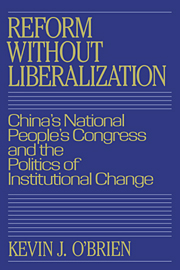 Reform without Liberalization
Reform without Liberalization 6 - Plenary sessions and policy discussions
Published online by Cambridge University Press: 22 March 2010
Summary
Although some Chinese commentators felt that the Gang of Four had damaged the people's congress system beyond repair, in February 1978, sixteen months after the fall of the radicals and three years after the last NPC, the legislature reconvened. In the 1980s, plenary sessions were held each year and legislative activity surpassed that at any time from 1954 to 1976. None of this was remarkably surprising. Radical political winds blew away the NPC; moderate winds brought it back. In the late 1970s and early 1980s, a shift in the balance of power toward Deng Xiaoping and fellow victims of the Cultural Revolution led to a reversal of leftist policies and efforts to institutionalize and regularize the exercise of power. The party reassessed its history and set out to correct leftist “mistakes,” including many that had crippled the legislature.
Undoing mistakes and changing long-standing policies was not without controversy, however, nor was it as speedy as some had sought. At times it was difficult to reach agreement on the distinction between “leftism” and “fine party traditions” on the one hand, and “bourgeois liberalization” and “socialist democracy” on the other. Tensions also arose between those seeking institutional reform and those wishing to return the People's Republic to its golden age (placed in the early to mid-1950s), before Mao launched his leftist experiments. In this environment, the NPC acted as a forum on de-Maoization and reflected disputes over how far it should proceed.
- Type
- Chapter
- Information
- Reform without LiberalizationChina's National People's Congress and the Politics of Institutional Change, pp. 91 - 124Publisher: Cambridge University PressPrint publication year: 1990


